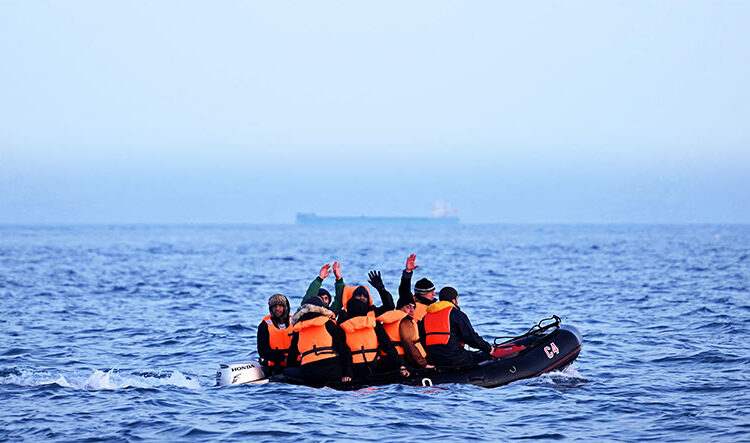
OVERCAST SKIES, low temperatures and frequent showers make it feel like the English winter is dragging its feet, refusing to make way for spring. High-street clothing stores sport spring collections in shades of lavender, pastel pink and teal, but on the streets, people are covered in long coats, dark bomber jackets, and woollen caps and scarves.
The bleak weather somewhat reflects the general mood in the country. Though the coronation of King Charles is less than a month away, there is no festive feel in the air.
Instead, politicians and the public are preoccupied with a multitude of challenges, particularly double-digit inflation and the cost-of-living crisis.
In recent months, the country has witnessed strikes the likes of which have not been seen in 40 years. Teachers, public transport staff, postal workers, nurses, doctors and border staff, among others, are demanding higher pay and better working conditions. The fallout of Brexit and Covid-19 had hit them hard.
The economic crisis has also exacerbated two inter-linked problems: homelessness and excessive migration.
Official figures released in February showed that homelessness in England had risen by 26 per cent in a year, because of the “spiralling cost-of-living crisis”.
Following the Taliban takeover of Afghanistan in 2021 and Russia’s invasion of Ukraine in 2022, there has been a massive influx of refugees into the UK.
Currently, around 9,000 Afghan refugees are staying in hotels in the country. On March 28, the government announced it would move the refugees into permanent homes on the condition that they accept the first property offered to them. If they did not, they would not be given an alternative. This has led to concerns that a bulk of the refugees, half of them children, will end up homeless.
As for Ukrainians, the UK, in 2022, welcomed more than 1.6 lakh refugees under various schemes that gave them housing in homes and hotels, and allowed them access to schools, health care, social welfare schemes and the right to work, for a stipulated time period.
Under the Homes for Ukraine scheme, thousands of UK sponsors agreed to house refugees for a minimum of six months. Now, as their placements end, many face homelessness as they struggle with finding jobs, rising costs, overcrowding and a shortage of rental properties. According to data released in February, more than 1,100 Ukrainian households had become homeless in London alone. On March 12, Prime Minister Rishi Sunak said the UK was “spending £5.5 million a day plus on hotels”, referring to the purported lodging costs of asylum seekers, indicating that sustaining these payments was untenable. In recent months, there have been numerous protests and counter-protests outside these lodgings, leading to a growing anti-immigration movement in the country.
Adding to this is the surge in the number of illegal migrants arriving by boat. These migrants are being blamed for overstretched public services, strained infrastructure, eating into benefits, and for making it harder for Britons to find jobs.
Sunak has made cracking down on illegal migration one of his government’s top priorities, emphasising that it will protect British jobs and the economy, and free up resources for citizens and legal residents.
On March 7, the government announced the Illegal Migration or the ‘Stop the Boats’ bill, which will change the law so that those arriving illegally will be detained and promptly removed either to their home country or to a safe third country.
Furthermore, on March 10, Britain and France signed a new deal where the former will fund the latter to deploy hundreds of extra French law enforcement officers along the English Channel coast to stop illegal migration.
Sunak’s strong anti-immigration stance has caused a stir, especially as he himself is a son of immigrants. Moreover, the ‘Stop the Boats’ bill has been widely criticised for being cruel, with critics saying it goes against international law and will end up in court if pushed through parliament.
Post Brexit, however, the UK is at liberty to frame its own laws and exert greater control over its borders. It can also implement stricter measures to restrict the flow of illegal migrants from EU member states.
Whether or not the bill becomes law remains to be seen, but for the moment, local councils and charities are warning of a looming humanitarian crisis.
On March 28, 54 charities and organisations signed an open letter to the Secretary of State for Housing Michael Gove, expressing deep concern about the impact of the bill on homelessness and destitution in the UK. “Alarmingly, the Illegal Migration Bill looks set to create an entirely new homeless and precariously housed population, increasing the likeliness of people rough sleeping on our streets and in our communities,” read the letter. It also stated that it would clearly undermine the government’s manifesto commitment to end rough sleeping by 2024.
Will the upcoming coronation and brighter, warmer days lighten the mood?
On April 4, the invitation for the coronation was released. To celebrate the new reign, it has a motif of the Green Man, an ancient figure from British folklore, symbolic of spring and a new birth. Britons will be hoping the same applies to their lives, too.






